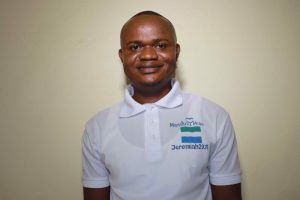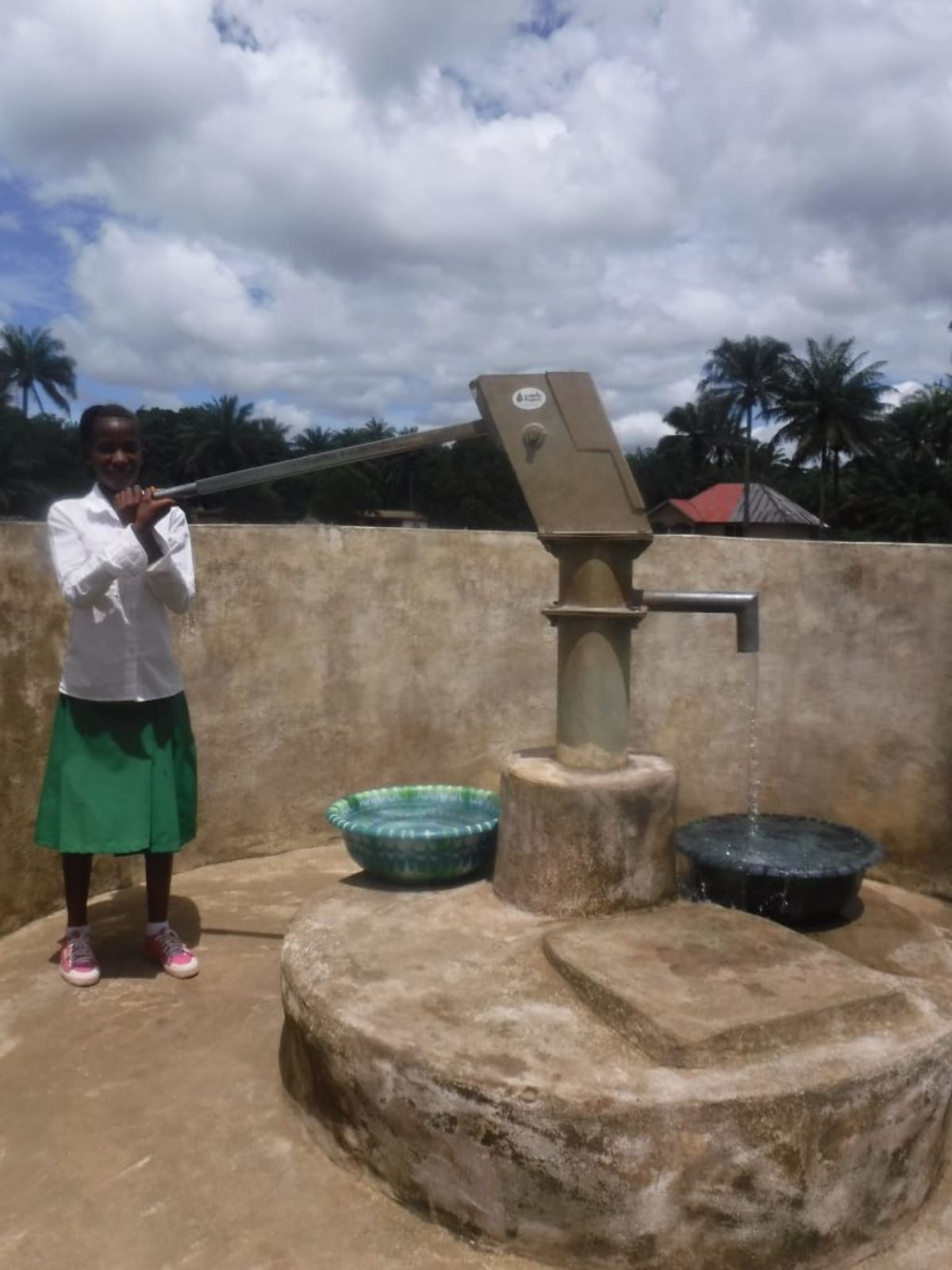October, 2022: DEC Karma Primary School Well Rehabilitation Project Complete!
We are excited to share that a safe, reliable water point at DEC Karma Primary School in Sierra Leone is now providing clean water to students and neighboring community members! We also conducted hygiene and sanitation training, which focused on healthy practices such as handwashing and using latrines.
"There was no water at the school to drink during [our] lunch break after I had eaten my food," said 14-year-old student Fatmata K. "It was also not easy to get water to use the larine. The school water well was not providing water for us to drink. My colleagues and I used to fetch water from the swamp to the school. It was very hard to fetch water from the swamp because of the long distance and the dangerous area."
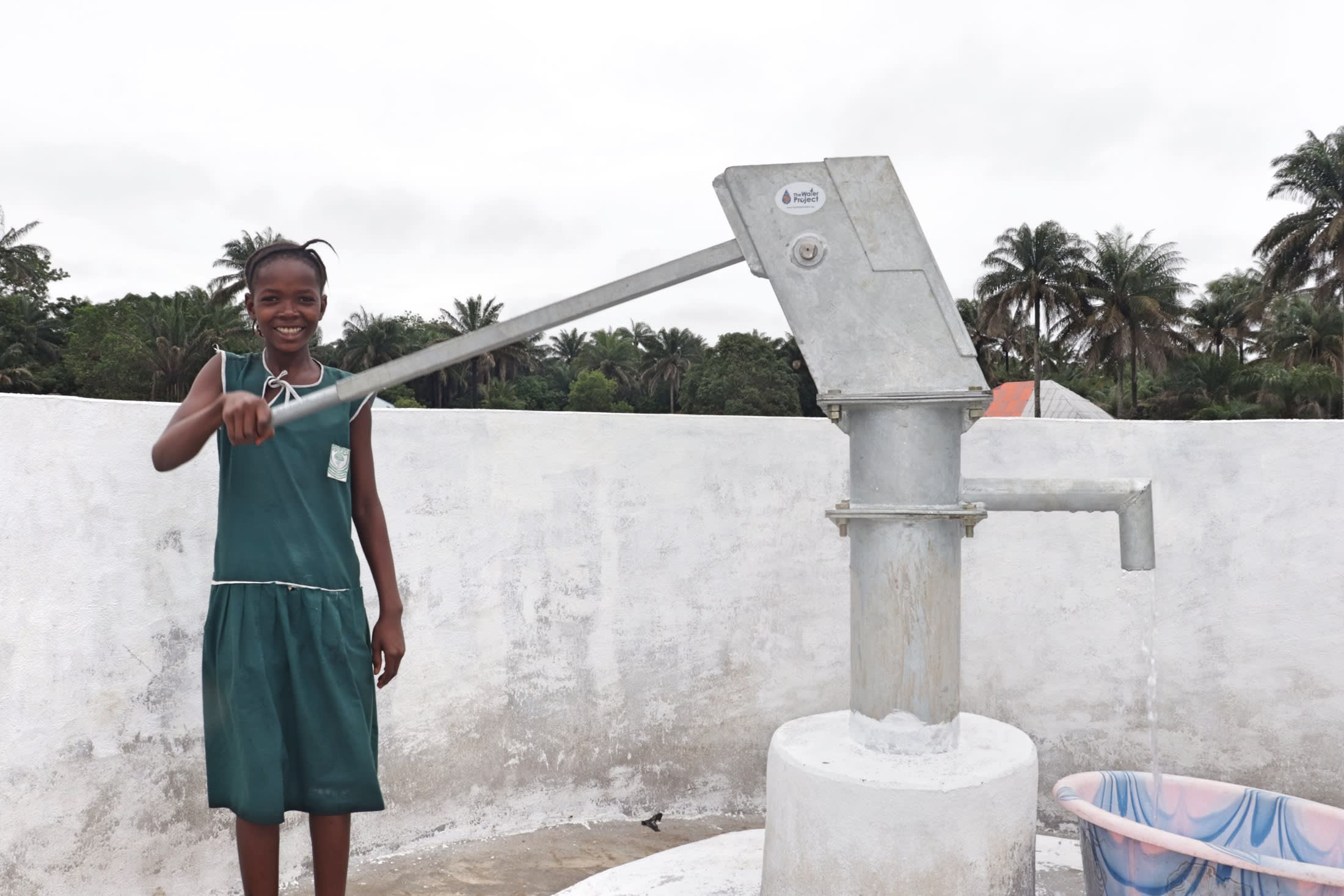
Fatmata pumps water at the rehabilitated well.
"My friends would be in the classroom attending lessons while we were going to fetch water from the swamp," Fatmata continued. "I could not get the complete lesson notes after I had returned to the class after fetching water from the swamp. Therefore, sometimes I found it hard to write well in examinations. It is good that the school water well is now working. It is now easy to fetch water from the school water well to my classroom or to use the latrine. I am happy because the school water well is providing enough clean water for us to drink even when we are in the classroom. I will not struggle for water at this school anymore."

Students aren't the only ones excited about the rehabilitated well.
"I was frustrated by the water situation in this school," said 51-year-old teacher Alimamy Kamara. "As a head teacher at this school, it was not easy for me to manage the water crisis of the school. I was worried about the proper use of the sanitation facilities in the school and the provision of pure drinking water to the pupils and other staff of the school."

Alimamy celebrates with students.
"I was especially worried about the safety of the pupils who used to go to the swamp to collect water," Alimamy continued. "My time to teach and to attend to other official duties were very limited because I paid more attention to the pupils and trying to make sure that they are safe by preventing them from going to the swamp in search of water by themselves. This made my job very difficult because there was no source of income to rehabilitate the school water well since it was broken down until [you did] it for us."

Alimamy, left, splashes water with other teachers.
Alimamy is doubly excited because he used to dip into his own wallet to supplement the school's water supply. Now, he can save that money for his family.
"It sometimes [became] unbearable for me when there was no water for the staff and the pupils to drink," Alimamy explained. "This sometimes urged me to buy a bundle of pure water from street vendors. I personally could not afford to provide money to buy a bundle of pure drinking water every day because it [would] economically deprive my family from getting the daily livelihood from the small amount of money that I get. It is now a great moment for me, receiving the school water well in a good working condition. My worries about [the] water shortage in this school [are] over."

Alimamy has a vision of improved hygiene and sanitation facilities for the school now that there is enough water.
"Now that the school water well is in good working condition, everyone in the school [will be] privileged to get water at any time easily," Alimamy said. "There will now be enough water [for the] buckets [in] the various classrooms for drinking, and the handwashing stations will also be filled with enough water to use."
We held a dedication ceremony to officially hand over the well to the community members. Several local dignitaries attended the ceremony, including representatives from the Port Loko District Council and the Ministry of Water Resources. Each official gave a short speech thanking everyone who contributed to the rehabilitation of the water project and reminding everyone to take good care of it. Then, Fatmata and Alimamy made statements on their community's behalf. The ceremony concluded with celebration, singing, and dancing.

Clean Water Restored
The drill team arrived the day before beginning work. They set up camp and unpacked all their tools and supplies to prepare for drilling the next day. The community provided space for the team to store their belongings and meals for the duration of their stay. The following day, the work began.

First, we raised the tripod, the structure we use to hold and maneuver each drilling tool. Next, we measured the well's original depth. We then socketed the pipes and installed a casing.
Finally, we lined up the drill rods and started to drill! We reached a final depth of 14 meters with water at eight meters. The hand-drill method allowed the team to install the cylinder far below the aquifer so that the community has excellent water access throughout the year.

With drilling complete, we installed screening and a filter pack to keep out debris when the water is pumped. We then cemented an iron rod to the well lining and fixed it with an iron collar at the top.
Next, we bailed the well by hand for three days and flushed it, clearing any debris generated by the drilling process. Finally, we tested the yield to ensure the well would provide clean water with minimal effort at the pump.

As the project neared completion, we built a new cement platform, walls, and drainage system around the well to seal it off from surface-level contaminants. The drainage system helps to redirect runoff and spilled water to help avoid standing water at the well, which can be uncomfortable and unhygienic and a breeding ground for disease-carrying mosquitoes.
At last, we installed the pump and conducted a water quality test. The test results showed that this was clean water fit for drinking!

New Knowledge
Before conducting any hygiene training, we called and visited the local water user committee to understand the community’s challenges and lack of sanitation facilities. We shared the findings from our discussions with the committee members to help them make the necessary adjustments before the training began. For example, we identified households without handwashing stations or ones that may need to repair their latrines. With this information, community members worked together to improve hygiene and sanitation at home.
After this preparatory period, we scheduled a time when members from each household using the water point could attend a three-day hygiene and sanitation training. We then dispatched our teams to the agreed-upon location to hold the meeting.
First, we trained the teachers for three days. Then, on the fourth day, they passed their newfound knowledge along to their students.

Training topics covered included handwashing and tippy taps, good and bad hygiene habits, disease transmission and prevention, COVID-19, worms and parasites, dental hygiene, proper care of the well's pump, keeping the water clean, the cost recovery system, dish racks and clotheslines, the importance of toilets, keeping latrines clean, balanced diets, the diarrhea doll, and HIV and AIDS.
One of the most memorable topics was disease transmission, during which we asked participants to arrange pictures of the stages of infection in chronological order. The students really enjoyed this exercise, crowding around the illustrations to ensure they could share their input.

One of the illustrations depicts flies going from a pile of feces to some food being prepared, spreading bacteria to those eating. Upon seeing this, a teacher named Mohamed Bangura shared a personal story with the training facilitators and his students: he had gone to a food vendor in an unfamiliar city. It tasted delicious, so he asked for more, but on the second plate, there was a cockroach in his rice. Later, he experienced a great deal of stomach upset that had to be treated at the local health center. Thankfully, this reinforced the lesson with the children that food should be covered and stored properly to protect it from contamination.

When we asked Mohamed what he thought of the training, he said: "The training is valuable to me because I can understand the causes of getting worms and parasites. Initially, I always had this perception that eating fish, mango, and palm nut [would] make one get worms. Now, I am aware that worms and parasites can be transmitted by drinking contaminated water or food, [and] walking barefoot, especially in dirty areas."
"I have learned a lot on hygiene practices, like [the] importance of covering food, always [ensuring] to wash our hands with soap and clean water, and the importance of cutting our fingernails," Mohamed continued. "The knowledge I received will enable me to take precautions on the things that I am doing presently in my daily life. I will make sure that I use these lessons to sensitize my pupils about the effect of bad hygiene practices in their various houses. Thank you for bringing light to our lives."
Conclusion
This project required a substantial collaboration between our staff, our in-country teams, and the community members themselves. When an issue arises concerning the well, community members are equipped with the necessary skills to rectify the problem and ensure the water point works appropriately. However, if the issue is beyond their capabilities, they can contact their local field officers to assist them.
Also, we will continue to offer them unmatchable support as a part of our monitoring and maintenance program. We walk with each community, problem-solving together when they face challenges with functionality, seasonality, or water quality. Together, all these components help us strive for enduring access to reliable, clean, and safe water for this community.
With your contribution, one more piece has been added to a large puzzle of water projects. In our target areas, we’re working toward complete coverage of reliable, maintained water sources within a 30-minute round trip for each community, household, school, and health center. With this in mind, search through our upcoming projects to see which community you can help next!
Thank you for making all of this possible!

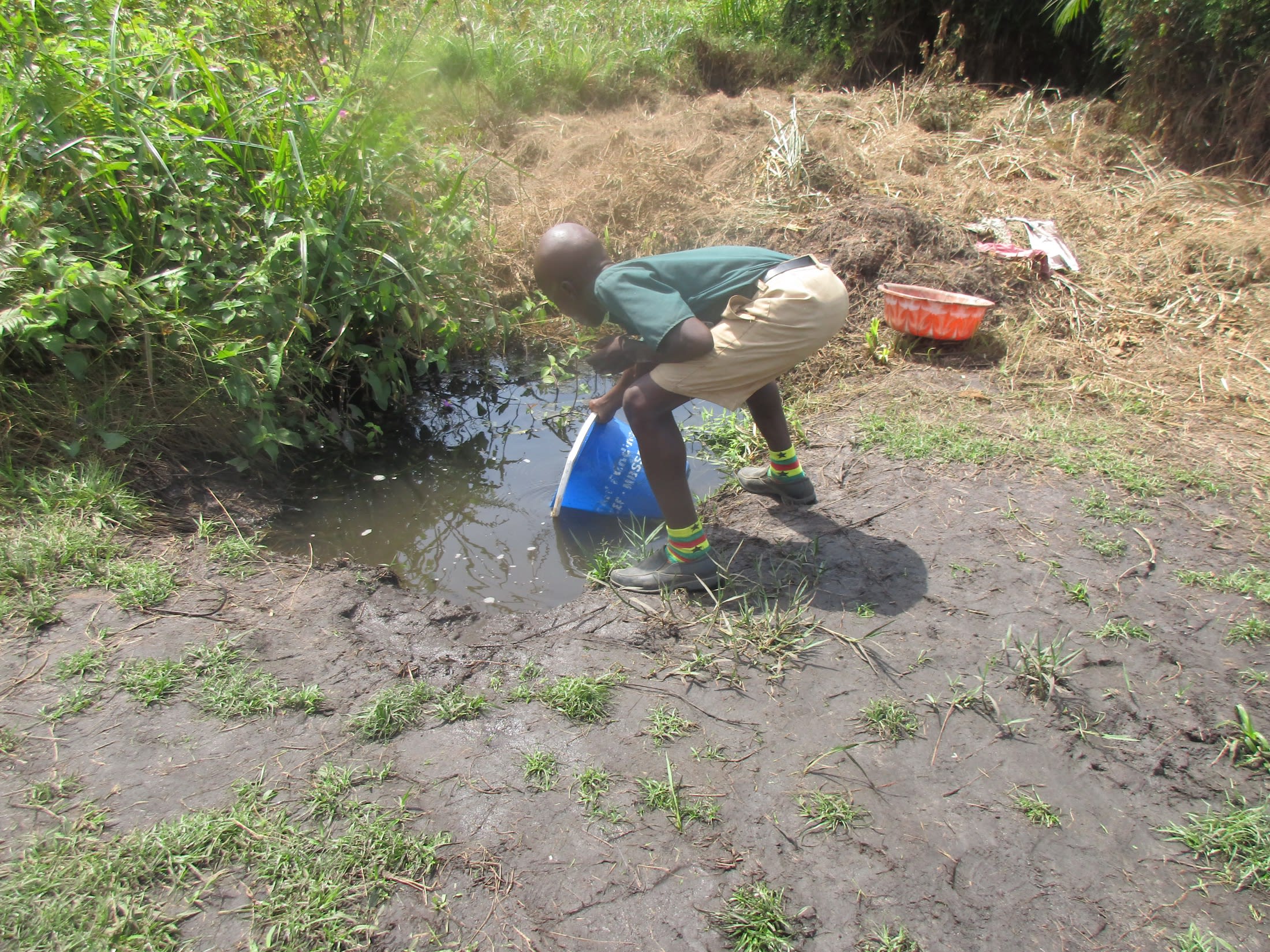
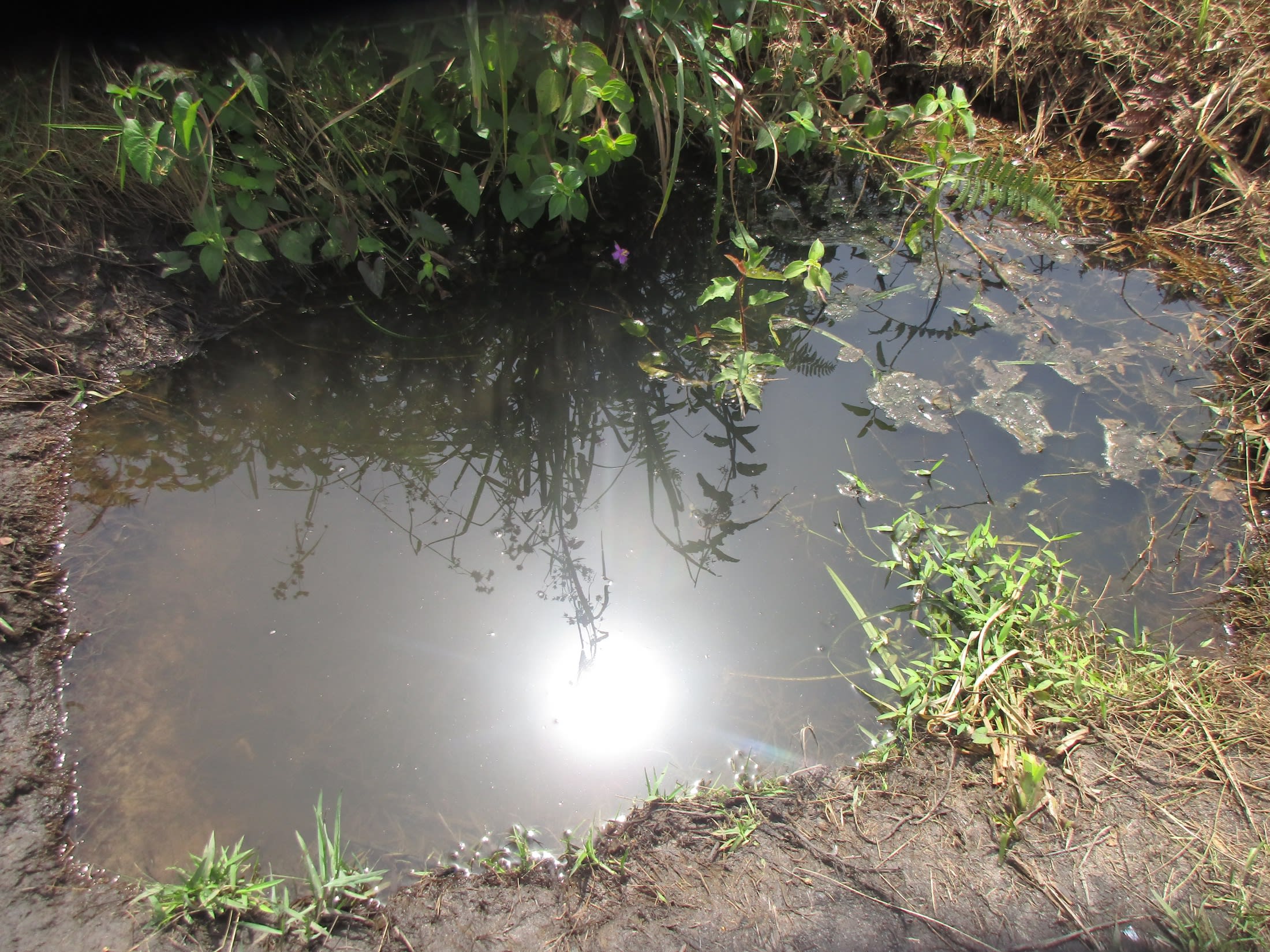
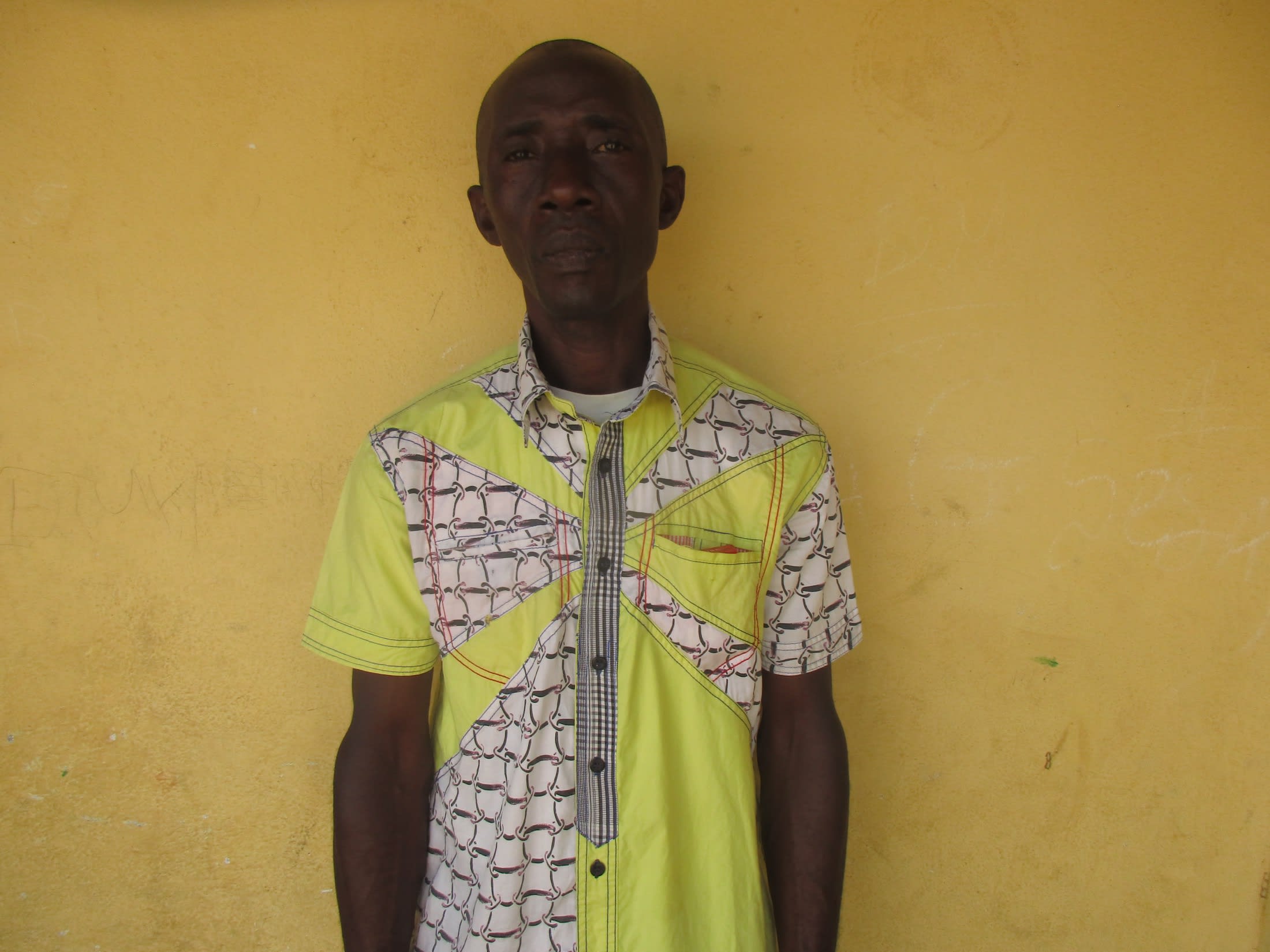
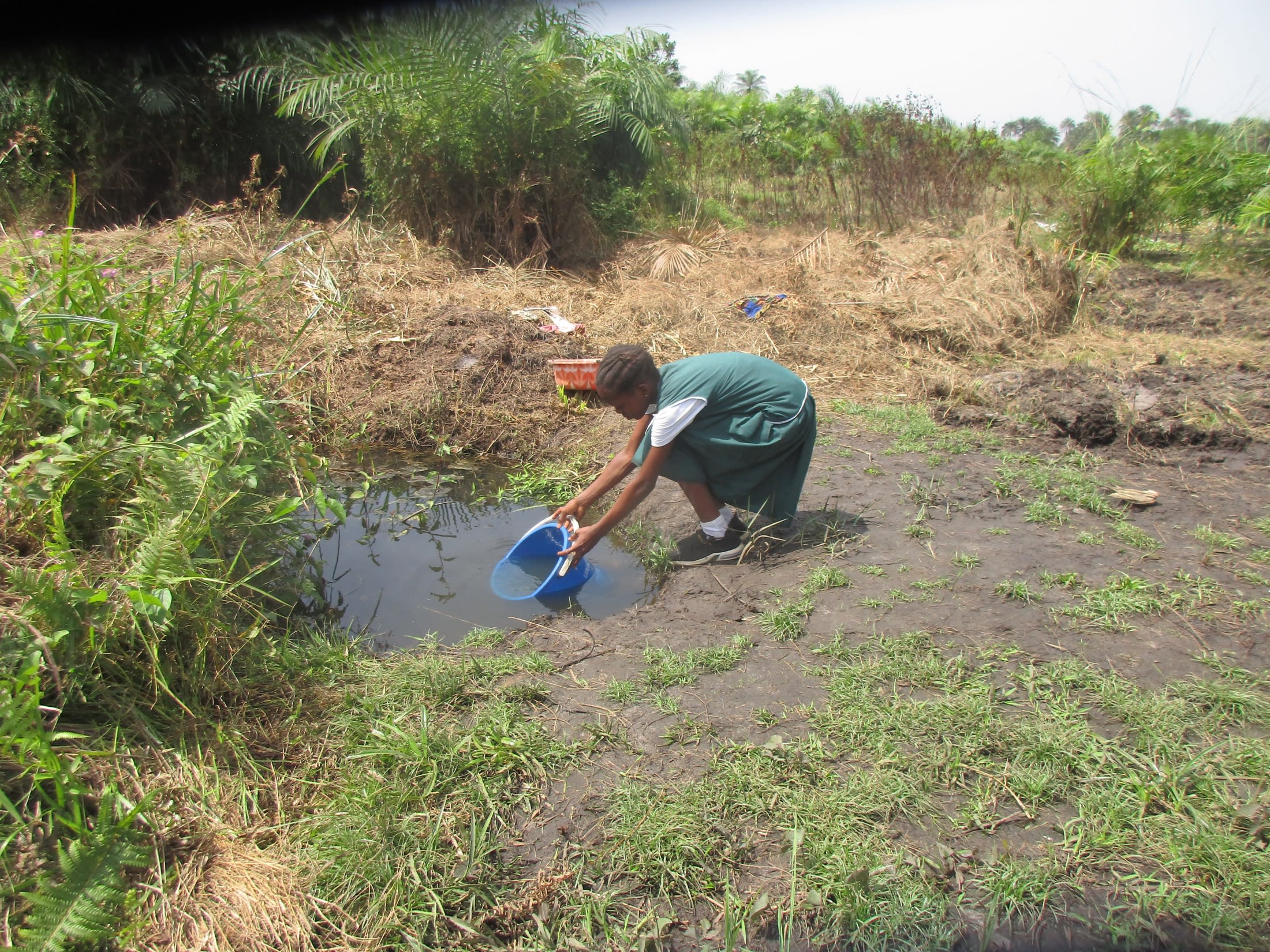

 Borehole Well and Hand Pump
Borehole Well and Hand Pump









